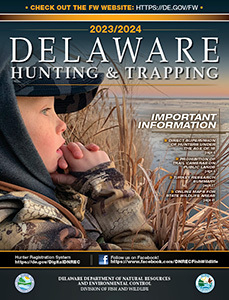Small Game Hunting
Small Game Seasons and Bag Limits |
|||
All seasons and limits subject to change. Please stay current by consulting the online version of this guide by visiting http://www.eregulations.com/delaware/hunting/ or call 302-739-9912. |
|||
Seasons |
Dates |
Limit* |
Additional Information |
Gray Squirrel |
Sept. 15 - Feb. 3 |
Daily |
Gray squirrels may be hunted with shotguns statewide, .17 through .22 cal. rimfire and .17 cal. pellet firearms and muzzleloading rifles up to .36 cal. south of the C&D Canal. Only shotguns may be used north of the C&D Canal. When a squirrel season overlaps with a deer firearms season, squirrel hunters must wear 400 square inches of hunter orange displayed on the head, chest and back. |
Possession |
|||
Cottontail Rabbit |
Nov. 20 - Feb. 29 |
Daily |
Rabbits may be hunted with shotguns, compound, recurve, and longbows. Rabbit hunters must wear at least 400 square inches of hunter orange material displayed on head, chest, and back when hunting during any deer firearms season. |
Possession |
|||
Groundhogs |
July 1 - June 30 |
No limit |
Groundhogs are an unprotected species and may be hunted with longbows, crossbows, shotguns, muzzleloaders, handguns, and rimfire or centerfire rifles. A hunting license is not required to hunt groundhogs. |
Ring-necked Pheasant |
Nov. 20 - Feb. 3 |
Daily |
Pheasants may be hunted with shotguns and longbows. Pheasant hunters must wear at least 400 square inches of hunter orange material displayed on head, chest, and back when hunting during any deer firearms season. |
Possession |
|||
Bobwhite Quail |
Nov. 20 - Jan. 6 |
Daily |
Bobwhite Quail may be hunted with shotguns and longbows. Quail hunters must wear at least 400 square inches of hunter orange material displayed on head, chest, and back when hunting during any deer firearms season. |
Possession |
|||
Bullfrog and Turtle Seasons |
|||
Seasons |
Dates |
Limit* |
Additional Information |
Bullfrog |
May 1 - Sept. 30 |
Daily |
May be taken with a valid hunting or fishing license. |
Possession |
|||
Snapping Turtle** |
June 15 - May 15 |
No limit |
Snapping turtle minimum length is 11 inches on the curvature of the top shell. Traps must be tagged with trapper’s name and address or current year’s license number. Baited fish hooks are unlawful. A free snapping turtle permit number must be obtained and will be issued at the time of the trapping license purchase. Those interested in trapping on Division of Fish and Wildlife lands and state-owned ponds will need to contact the Regional Manager for an additional permit for those lands. |
Diamondback |
Sept. 1 - Nov. 15 |
Daily |
There is no possession limit on diamondback terrapin that have been lawfully taken and of lawful size, when it is lawful to have said animals, their meat, and skins in possession. |
Possession |
|||
Delaware Squirrels
Sussex County hosts two species of diurnal tree squirrel: Gray and Delmarva Fox
Gray squirrels are quite common while Delmarva fox squirrels are so rare they are on the state Endangered Species list.
If you hold a Delaware hunting license, you are permitted to hunt gray squirrels but NOT fox squirrels. Before you shoot, take a good look at the squirrel in your crosshairs! In addition to looking different, Delmarva fox squirrels also behave differently; are more likely to walk on the ground rather than jump from tree to tree as with gray squirrels.
Efforts to restore DFS to Delaware have included adding squirrels to Assawoman Wildlife Area, Redden State Forest, and Trap Pond State Park. The squirrels have expanded out to surrounding woodlands so please take special care in those areas. In the case of Trap Pond, you are especially likely to see them in the Raccoon Pond Tract but they have also spread out as far as seven miles from the park.
If you have seen a Delmarva fox squirrel, please call the Species Conservation and Research office 302-735-3600 and, if you have a camera, take a picture. Hunters often see the squirrels while hunting and we would love to hear about it if you do. Thanks!
Gray Squirrel
FUR: Darker gray with rusty brown highlights
EARS: Longer and pointy
BELLY: White
SIZE: Smaller with less bushy tail
Delmarva Fox Squirrel
FUR: Silver gray with creamy to white belly, ears and muzzle (rarely have any brown fur)
EARS: Shorter and wider
BELLY: Creamy white
SIZE: 11⁄2 times larger with fuller tail

